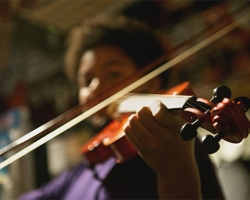This month’s question is one I’m asked frequently from many concerned parents: “How do I get my child to practice a musical instrument without threats, bribes or punishment?”
Like many parents, I have struggled with getting my girls to practice. As the parent who is paying for the lesson, it only seems reasonable that one should be able to make a child practice for just 30 minutes every day. Alas, this is often not the case.
One of the first necessary steps is to sit down with your child and discuss the child’s goals and aspirations for playing an instrument. In fact, it is important to determine if it is the child who wants to learn the skill or if it is the parents’ desire for the child. Let’s face it, there comes a time when children know their likes, dislikes and interests, and to the parents’ disliking, it may not include music education.
If it is determined that the parents want the lessons more than the child, then I would persuade you to kindly request that your child give it a try for a set amount of time, and that you be flexible about the particular instrument the child is able to choose. Giving a choice of instrument will go a long way in enticing a child to play. If after the predetermined amount of time has passed, your child says it’s just not for him/her, kindly thank the child for giving it a try and explain that you will support attempts to learn another instrument, as well as future endeavors with that instrument.
Assuming your child is on board with the idea of learning a musical instrument, I encourage you to have an open dialogue about the responsibilities that come with taking lessons. These might include the responsibility to practice so that the student can progress, a responsibility to the parent who’s paying the bill, and the responsibility to the music instructor.
Create an agreement with your child about when he/she will practice and for how long. I’ve found that when this is included as part of the child’s routine chart it’s more likely to happen than if it is just left to memory. In my home, practicing before school when the girls were young seemed quite effective, but nonetheless required follow-through on my part.
If you have a child who has been taking lessons for a period of time and has only recently started to dread practicing, it may be time to change teachers, or discuss changing it up a bit with the instrument or style of music being learned. It is human nature to become complacent, so don’t be afraid to mix things up. Having a little added challenge might be exciting for everyone.
Kevin Mitchell, a senior at Culver City High School, who took piano lessons and enjoys playing even though he no longer takes the lessons says, “Children have to like doing it. They need to be playing songs they like, and the teacher is everything.”
Liz Kinnon, a jazz piano instructor in Culver City and at the Colburn School of Performing Arts, cautions parents not to overburden their children with the task of learning a musical instrument. “So many children are overscheduled, they simply don’t have the time to practice” says Kinnon. She also says, “Parents should just be glad their kids have their hands on the piano at all.”
Marni Parsons is a PCI Certified Parent Coach®, Certified Positive Discipline Parent and Classroom Educator & Family Consultant. For a 45-minute complimentary strategy session, visit acoach4parents.com or call (310) 435-3622.

